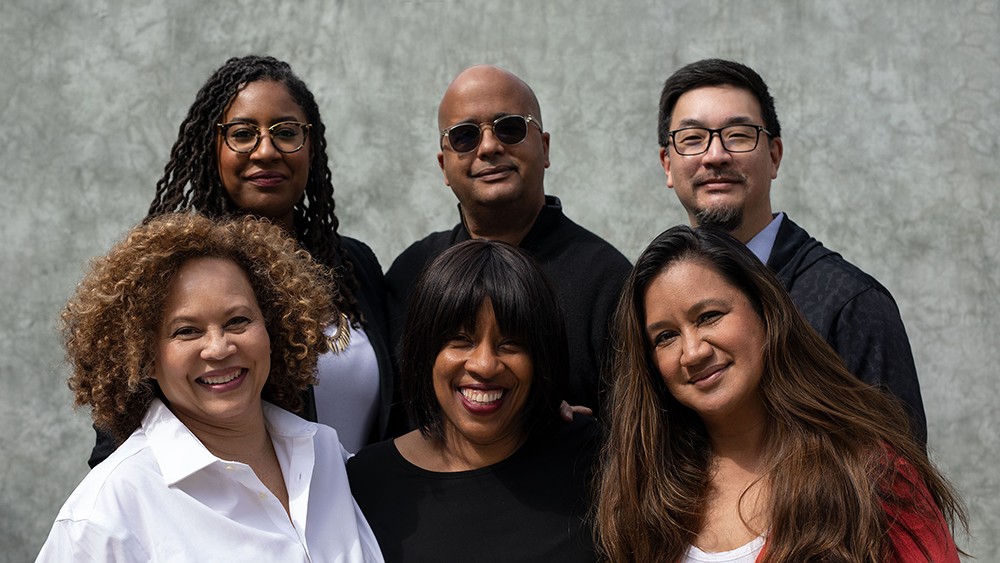Executives of color have been landing high-profile jobs in the entertainment industry at an unprecedented rate amid the broad social reckoning with systemic racism.
No one could be cheering harder for this wave of opportunity to lead to lasting change in Hollywood than the leaders of Colour Entertainment, a nonprofit dedicated to maximizing the potential of executives of color in the industry. And no one is better positioned to help make this moment matter than those who have spent most of their careers as the only Black or brown face in the room.
“I worry that we’ll look up in two years and we’ll be back where we started,” says Rose Catherine Pinkney, a BET programming executive, and Colour board member. Pinkney has held senior creative roles at Paramount Television, TV Land, TV One, and Laurence Fishburne’s Cinema Gypsy Prods. over her long career.
And to be sure, there is still a major dearth of executives of color in senior management positions and boardrooms across the entertainment and media business.
“The mission at its core feels even more relevant today,” says Eric Kim, a Colour board member who is senior VP of current programs for CBS.
Since its founding in 2000, Colour’s focus has been to guide young and less experienced executives of color through the maze of careers in the content business. The organization aims to facilitate safe spaces for Black and brown executives to talk, vent, celebrate and strategize about how to get ahead while carrying the extra burden in a culture that remains thoroughly dominated by white men. Colour is the only service group of its depth to focus on support and development programs specifically for entertainment executives.

The organization has been active for years, hosting a range of networking opportunities, from dinner events with top-level studio and network executives to panels and Q&As with other prominent players across the industry. It also runs annual executive leadership programs that have been expanded this year into a virtual format, just in time to help people take advantage of the demand for executives from underrepresented backgrounds.
“Given the cultural landscape that we’ve been in for the last couple of years, we have been a [hiring] resource for a lot of companies,” says Kim. “They can no longer hide behind the idea of ‘Oh, we looked and there was nobody out there for the job.’”
The volunteer-led nonprofit has never sought media coverage of its activities. But after the tumult of 2020, key founders and board members decided it was time to speak out about Colour’s work for the first time. In a candid series of interviews with Variety, board members highlighted what they see as the promise and the perils for executives of color amid an extraordinary period of disruption in the entertainment industry.
“Other than the systemic issues that people of color have always faced, we’re talking about how people are surviving the culture of their companies,” says Kelly Edwards, a Colour co-founder, and former executive with UPN, NBC, and HBO who recently transitioned to a first-look producing pact with HBO Max.
Corporate shake-ups, massive realignment of operations, mass layoffs, remote work, and the social upheaval from the killing of George Floyd last May have only made workplace culture that much more challenging for many.
“We’re going through a time when executives of color have an extra burden in that they’re now seen as the diversity experts for their departments,” Edwards says. “We went through a very, very traumatic and troubling year, and now they’re being turned to, to speak for their entire culture.”
Edwards and Bruce Evans, a longtime NBC programming executive, co-founded Colour Entertainment out of frustration more than 20 years ago. (As for why they opted for the British spelling of Colour, Evans admits, “We just got a little fancy.”)

Even with the recent hiring boom, the mass layoffs implemented in recent months across WarnerMedia, ViacomCBS, Disney, NBCUniversal, and others have led to an exodus of senior executives from all backgrounds. Because the ranks of people of color in senior management are generally low, even a few executives lost to layoffs puts a big dent in representation.
Moreover, losses in the ranks of VPs and senior VPs mean fewer contenders with the requisite experience for openings at the executive VP and president level, let alone the C-suite.
“We’re not in the workforce in such significant numbers already that those cuts make a huge impact,” Edwards says. “The good news is because there is so much demand for executives with diverse perspectives, those people aren’t necessarily staying out of work long.”
As the world went into pandemic lockdown last year, it was a fortuitous time for Colour to expand its executive leadership program in a virtual format. At present, Colour Entertainment has 12 fellows participating in leadership seminars held on Saturdays over a four-month period. The plan is to offer additional seminars for executives with more industry experience later this year.
The sessions at times are full of practical information like how to read a TV series budget, how to lead a meeting, and how to suss out when to pitch an idea (and when not to). The discussion also delves into subjects like dealing with crippling feelings of imposter syndrome, or what Colour board member Margie Moreno calls being given “a check-mark position.”

In interviews to select the fellows for the winter leadership program, Moreno, who is head of Latin America for YouTube Originals, says she was struck by the number of applicants grappling with the painful sense of being perceived as a token hire.
“One thing that kept coming up in interviews was the feeling that they are serving as a ‘check mark’ rather than having a meaningful opportunity,” Moreno says. “They’re excited about those opportunities, but they’re concerned that they don’t have the skill sets or the community around them to influence up as much as they need to.”
What’s more, executives of color often feel extra pressure to perform at the top of their game to impress and advance.
The leadership program and other Colour events “gives us a safe space to talk about this and for [people] to find that community and their cohorts,” Moreno adds. “You don’t find that safe space and that community that we’ve created here in very many places.”
Edwards, who previously ran diversity and executive development programs for HBO and NBC, says it’s imperative for executives of color to understand their strengths and weaknesses lest they be pigeonholed by others.
“Not everybody has the same style or the same skill set,” Edwards says. “You have to figure out how to craft your own narrative of what you want to be as a leader.”
Colour Entertainment has three main branches: Colour TV, Col-our Film, and Colour Associates, the last for assistants and coordinator-level employees. The growth in membership of the organization, which stands at more than 550, has come largely by word-of-mouth.
“What I love about Colour is that we’re supporting and uplifting and encouraging executives,” says Rosalyn Douglass, coordinator of West Coast production for HBO, who serves as president of the Colour Associates board. “There are so many groups for writers and so many for actors and directors. It took a long time for me to really understand that this could be a career and that I could gain the skills to move up.”
Colour tries to help those at the entry-level navigate a confusing and famously insular business. For the best and brightest coming out of colleges, entertainment’s grueling mailroom and assistant experiences can be less enticing than other sectors with promises of bigger paydays, like tech or finance or sales.
“One of the biggest challenges for many of the potential executives entering the workforce is that they are first-time college attendees. They are paying student loans and they are breadwinners for their family,” Moreno says. “They have a double obligation that prevents them from risking their careers as much as somebody else.”
The group’s programs and events, including a long tradition of hosting networking dinners with top brass from NBC, Disney, Warner Bros., HBO, and more, are typically underwritten by the industry’s major corporate players. Sponsors for this year’s leadership program include Amazon, NBCUniversal, and Sony Pictures.
The organization also serves as a busy clearinghouse for one-on-one mentoring pairings. In 2020, Colour leaders facilitated 64 pairings of mentors and mentees. This year they’re on track for at least 71 pairings, Edwards says.
Most of Colour’s leadership team has decades of experience in the industry. As such, they can’t help expressing notes of caution amid the optimism that the systemic roots of institutional racism will be attacked by today’s commitments to a more inclusive approach to hiring.
“This is a moment when the visibility is high, the talk is high, the temperature is high. One of the things I fear is that it’s just for right now,” says Pinkney. “What we’re trying to do with the leadership program is make sure that people have the skills — and sometimes not just the skills you can write down on a list. Sometimes there are hidden skills you need. We want people to make it through this moment when diversity is in. In two years, when it’s not, we want to make it so these people have moved up and are performing well and are going to make it to the C-suite.”
Evans and others point to the 2000-01 period when the NAACP led a coalition of ethnic advocacy groups to protest the complete absence of actors of color in lead roles in the raft of new primetime series on ABC, NBC, CBS, and Fox for fall 2000. The NAACP, the National Council of La Raza, the National Asian Pacific American Legal Consortium, and others organized a noisy boycott of the Big Four. They commanded national attention by holding a high-profile public hearing in Los Angeles in November 2000. There was high drama when Leslie Moonves of CBS was the only one of the four invited network chiefs to show up.
The result by early 2001 was a series of separate diversity compacts between the coalition groups and the networks. The advocacy groups made their points about the importance of primetime reflecting an increasingly multicultural audience on the national stage and specifically on Madison Avenue. The tangible gains included the appointments of the first dedicated VPs for diversity and inclusion at Fox and CBS. Other outlets followed.
“All of sudden we had ‘Entertainment Weekly’s Top 25 Diverse Executives’ list and it was like, whoa, where’d that come from?” recalls Evans, who joined NBC’s current programming department in 1998. He rose to executive VP of current in 2017 and ran the department for four years, directly overseeing the “Law & Order” franchise and other pillars of the network. He exited NBCU earlier this year amid its broad restructuring of broadcast and cable TV operations.
Evans is among those who note that while there was a rush of hiring 20 years ago, the volume slowed down in subsequent years. That meant the pipeline of Black and brown executives was still thin — extremely so in the case of Latino contenders — when the early 2000s wave of hires inevitably fanned out beyond the core executive ranks. Some moved from senior studio and agency posts into privately funded and culturally focused production operations, such as former WME partner Charles D. King, who founded Macro, and DeVon Franklin, the former Sony Pictures executive who runs the faith-based Franklin Entertainment as well as serving as a Seventh-day Adventist preacher, motivational speaker, and author. Some shot up the executive ranks, among them Channing Dungey, the former Disney/ABC and Netflix executive who is now president of Warner Bros. TV, and Pearlena Igbokwe, who rose to prominence at Showtime and now steers all of NBCUniversal’s TV production as chairman of Universal Studio Group.
But a springboard for some does not constitute systemic change. Without more candidates of color entering the studio-network ecosystem in greater numbers, the opportunities for executives to rise into the top executive management echelon remained few and far between.
“We’ve been here before and know that it didn’t result in a whole lot of progress,” says Evans. “The older set is somewhat jaded but certainly hopeful that there will be real change.”
Kim notes the horror of the March 16 shootings in Atlanta that left eight dead, including six women of Asian descent, which came just a day after Asian creative talent broke through in a major way with Oscar nominations for “Nomadland” director Chloé Zhao and “Minari” director Lee Isaac Chung and star Steven Yeun.
“It’s hard to have these groundbreaking moments with Steven Yeun, ‘Minari,’ Lee Isaac Chung and Chloé Zhao and then a day later have Atlanta. It just brings you back to earth a little bit,” Kim says.
Indeed, the vast expansion of the television universe has transformed the content marketplace, opening up new avenues of distribution for diverse creators. The past few years have seen landmark productions such as Donald Glover’s FX series “Atlanta,” Issa Rae’s HBO comedy “Insecure” and Kenya Barris’ ABC sitcom “Blackish.” Multi-hyphenates such as Shonda Rhimes and Tyler Perry have built their own studio empires. But there remains a chasm for shows with diverse leads on some of the most mainstream of American platforms.
“I’ve been a beneficiary of networks who boldly develop something with people of color, make a pilot, and then don’t put it on,” says Pinkney, citing BET projects that were recently picked up from Hulu and TBS. “We often compete for shows in development, and then I always say, ‘Go ahead, make your money, I’ll see you next year.’ ”
Colour Entertainment, which became a 501c3 registered nonprofit in 2018, has the ambition to grow its array of service and education activities in the coming years. It’s driven by longtime board members out of passion and a sense of obligation to the next generation on the way.
“We wanted to make sure the folks that were coming in behind us didn’t have to go through the same stumbling blocks that we did in order to get up into that level,” Edwards says. “We knew we had some real learnings we thought we could pass along.”
Evans stresses that Colour has also been nurtured out of necessity for executives who were among the first of color to routinely take a seat at the table for the day-to-day business: programming meetings, casting sessions, marketing, and strategic planning meetings. As long as he lives, Evans will never forget the sight many years ago of a senior NBC executive performing a stunningly racist impression of then-NAACP president Kweisi Mfume when the executive was unaware Evans was in the room.
“The roots of Colour Entertainment were that we as a community needed a place where we felt safe to commiserate and to talk about the experiences we were having,” Evans says.
The seeds of the effort were planted by Edwards and Evans over a long dinner in November 2000 at Hollywood’s Off Vine. Two decades later, the pair are proud of what they’ve built and eager to see it grow with substantive programs.
“The leadership program falls right in line with what we always hoped to do with the organization,” Evans says. “We know that once we’re in those decision-making positions, then the industry will truly be reflective of the community it serves. It’s always been my hope that we would help create the decision-makers of the future.”


Recent Comments